Why I Turned Right by Mary Eberstadt

Author:Mary Eberstadt
Language: eng
Format: epub
Publisher: Simon and Schuster
Published: 2007-07-15T00:00:00+00:00
Back at U.C. Berkeley, I strolled the plaza at lunchtime, listening to live rock music and watching students dressed in a thousand styles of blue jeans stuff themselves with meat at boutique-style cafeterias. I rolled my eyes at the omnipresent activists passing out Marxist literature. I couldn’t forget that I might have gotten some poor Russian into trouble just for giving him a taste of what these kids took for granted.
Now this news junkie read the New York Times with changed eyes. Reagan, Reagan, it was always Ronald Reagan: James Reston, Tom Wicker, and the rest seemed to care more about Ronald Reagan’s “evil empire” remark than about the reality of the Soviet Union. Against my own inclinations, I had to admit that Reagan was right. When the president was shot by an assassin early in his term, I heard people on campus cheering. Again those pig heads. Again my disgust.
When Reagan’s U.N. ambassador, Jeanne Kirkpatrick, came to Berkeley to give a speech, demonstrators shouted her down. That was unsurprising, but it took me aback when even faculty members argued that Kirkpatrick ought to have been silenced. In the new enlightened view (a world away from the ACLU’s stand in Skokie), oppressors had no free speech rights. Of course, calling Jeanne Kirkpatrick an oppressor was itself ridiculous. Kirkpatrick was a hero to Soviet dissidents, who hung on her every word. Yet here in Berkeley even faculty members deemed it noble to effectively confiscate Kirkpatrick’s talk, as if they were airport censors in Moscow. As for me, I hadn’t subscribed to Vital Speeches of the Day to buy into the idea of quashing a real live vital speech.
By the time I returned to Harvard to finish up my dissertation in 1986, affirmative action was pervasive. A teaching assistant confessed to me that he was giving his minority students inflated grades. When Harvard professor Harvey Mansfield got into trouble years later for claiming that affirmative action had played a role in grade inflation, I believed him. Moreover, with scientists still overwhelmingly male, colleges were turning to the humanities and social sciences to make up informal gender quotas for faculty appointments. In my field, where since Margaret Mead women have always had a presence, women were getting the good jobs. Men languished.
But the deeper effect of affirmative action was intellectual. Initially, affirmative action had been treated as a regrettable necessity: a temporary violation of individual rights for the sake of a greater good. But no one wants to think of himself as a temporary exception to proper academic standards. So the beneficiaries of liberal condescension became the carriers of a new ideology. The rise of academic postmodernism, with its assumption that classic democratic principles are just a cover for white, male, heterosexual, first-world power, is directly attributable to affirmative action. Precisely this sort of thinking leads to the notion that “oppressors have no free speech rights.”
Download
This site does not store any files on its server. We only index and link to content provided by other sites. Please contact the content providers to delete copyright contents if any and email us, we'll remove relevant links or contents immediately.
| Anarchism | Communism & Socialism |
| Conservatism & Liberalism | Democracy |
| Fascism | Libertarianism |
| Nationalism | Radicalism |
| Utopian |
The Secret History by Donna Tartt(16623)
The Social Justice Warrior Handbook by Lisa De Pasquale(11489)
Thirteen Reasons Why by Jay Asher(7788)
This Is How You Lose Her by Junot Diaz(5772)
Weapons of Math Destruction by Cathy O'Neil(5037)
Zero to One by Peter Thiel(4824)
The Myth of the Strong Leader by Archie Brown(4789)
Promise Me, Dad by Joe Biden(4447)
Beartown by Fredrik Backman(4419)
Stone's Rules by Roger Stone(4415)
How Democracies Die by Steven Levitsky & Daniel Ziblatt(4399)
The Fire Next Time by James Baldwin(4343)
100 Deadly Skills by Clint Emerson(4078)
A Higher Loyalty: Truth, Lies, and Leadership by James Comey(4033)
Rise and Kill First by Ronen Bergman(4012)
The David Icke Guide to the Global Conspiracy (and how to end it) by David Icke(3882)
The Farm by Tom Rob Smith(3872)
Secrecy World by Jake Bernstein(3782)
The Doomsday Machine by Daniel Ellsberg(3731)
